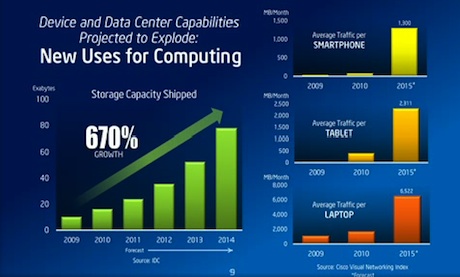Intel's Otellini: Tablet race is nowhere near finished

Heading into Intel's annual investor relations meeting on Tuesday, some of the big questions expected to be answered were about Intel's focus on mobile devices. Surprisingly, Intel is focused on something a bit bigger than smartphones and tablets.
Intel's CEO Paul Otellini emphasized Intel's plan for embedded devices, as it is the fastest growing sector of the company's business. Naturally, this included smartphones and tablets.
Although Otellini glossed over smartphones saying that there wouldn't be a big announcement regarding those devices during the meeting, tablets naturally took part of the spotlight. Affirming that Intel is "on track" with developing chips for tablets, Otellini said that Intel is working on 35 designs for multiple operating systems, including Windows-based models already shipping. Demos of tablets running on MeeGo as well as Android would be on display at the investor meeting in Santa Clara.
Nevertheless, Otellini argued that the future of the tablet market is still undetermined:
The tablet race is nowhere near finished. No one knows the size of this market. It's not just about tablets but different variants of it...It will require a tremendous amount of experimentation here for several years.
But more interestingly, Otellini spoke extensively about smart TVs. Here's some of the highlights:
- First smart TV products with Intel chips in 2010 were Google TV products
- Another round of Google TV with Intel power is about to be launched
- There are nine versions of smart TVs with Intel chips shipping today
- Smart TV adoption is not as popular in U.S. as it is in Europe
- The leaders in Europe are France's Free and Italy's Telecom Italia
- Smart TV products are shipping at a rate of 10,000 per day
However, as with any computing device, security is a serious focus on all of these products. That even applies to smart TVs, which are a fraction of the overall Internet-connected device market, but as they become more popular and pervasive, Otellini said, they will become a target by hackers.
Briefly touching on the security breaches seen at Sony and Microsoft this year, Otellini stated that "security is under addressed and an increasingly important element of our industry." Security has to be a primary element on mobile devices as they "carry more of our lives with them" each day.
Some of the measures Intel will be working on (which might sound controversial at first) including implementing more advanced tracking technology so that owners can not only determine the location of a mobile device but also disabling data and turning the machine off. Such technology is already seen today in several mobile devices, particularly on the iPhone and the iPad. Furthermore, Intel is working on a platform that enables one strong password that spans multiple devices. That also sounds a bit scary at first because if the wrong person finds out the password to one device, what is to stop the intruder from hacking into everything else?
However, Otellini promises that it will be "very simple and very secure at the same time." We'll have to wait and judge Intel's results when they become available.
Related coverage on ZDNet:
- Intel focusing on building universal chips for multiple devices, platforms
- Nvidia CEO: Next wave of Android tablets address first-gen shortcomings
- Can Intel Cedar Trail Atom processors, along with Google Chromebooks, resurrect the netbook?
- Intel's update to Wireless Display 2.0 allows streaming of protected content to HDTVs
- Intel shows the way forward with breakthrough semiconductor design
